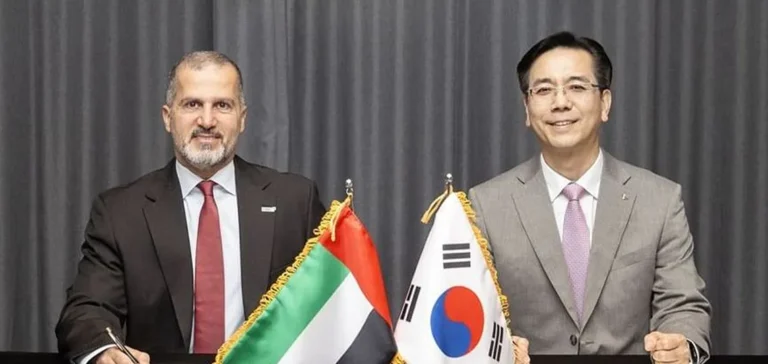Emirates Nuclear Energy Company (ENEC) has formalised the signing of two memoranda of understanding aimed at accelerating industrial cooperation in the civil nuclear sector. These agreements, concluded with Hyundai Engineering & Construction (Hyundai E&C) and Westinghouse Electric Company respectively, reflect ENEC’s ambition to establish itself as a central player in the development and international deployment of next-generation nuclear technologies.
A strengthened partnership with Hyundai E&C
During a visit to Seoul, ENEC’s management formalised a memorandum of understanding with Hyundai E&C, the main contractor for the Barakah nuclear power plant. The agreement was signed by Lee Han-woo, Chief Executive Officer of Hyundai E&C, and Mohamed Al Hammadi, Chief Executive Officer of ENEC. The protocol provides for the creation of a joint working group to identify new international projects and assess strategic joint investments in civil nuclear energy. It also establishes knowledge sharing and the development of industrial synergies, building on experience gained during the construction of the four Barakah reactors.
According to a Hyundai E&C spokesperson, this protocol represents a concrete step in exploring new markets, particularly in the Middle East, North America, Asia and Europe. The South Korean company aims to strengthen its global presence through this partnership, in response to the anticipated increase in nuclear capacity projected by the International Energy Agency (IEA) and the International Atomic Energy Agency (IAEA) for 2030 and 2050.
New momentum with Westinghouse in the US market
At the same time, ENEC announced the signing of a memorandum of understanding with Westinghouse Electric Company to accelerate the introduction of AP1000 reactors in the United States. This partnership will allow ENEC’s large-scale nuclear development and operations expertise to be combined with Westinghouse’s technologies. Discussions focus in particular on the restart of existing nuclear projects and the creation of new business models for the AP1000, including fuel supply, operational services and maintenance.
This partnership follows a series of recent agreements concluded by ENEC with various global players, aiming to broaden its role in advisory, investment and delivery of nuclear projects for both conventional reactors and emerging technologies.
Expansion of the Emirati industrial model internationally
With the Barakah plant now operational, ENEC is focusing its efforts on leveraging its expertise and developing structuring partnerships at the international level. The company says it wants to support the acceleration of nuclear deployment abroad, while remaining open to cooperation with states seeking to strengthen or diversify their nuclear production capacity. The initiatives undertaken with Hyundai E&C and Westinghouse illustrate this strategy of openness and export of the Emirati industrial model.
“Collaboration with Westinghouse represents a major step in supporting the rapid expansion of the nuclear fleet in the United States,” said Mohamed Al Hammadi, highlighting the complementarity between the experience of the two companies in a context of global sector growth.






















